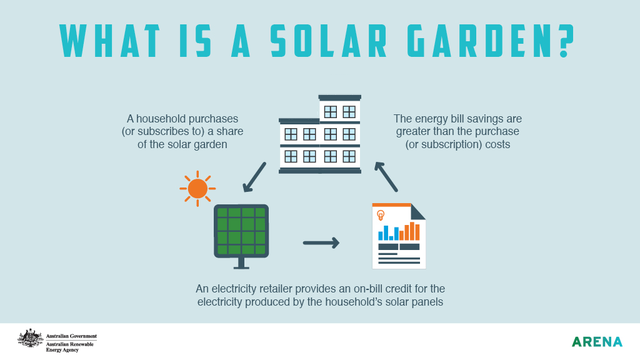The Australian Renewable Energy Agency (ARENA) will provide a grant of $240,000 to the $555,000 project, designed to assess demand and possible constraints for ‘solar gardens’ development. The University of Technology Sydney will carry out the feasibility study looking at five potential sites in New South Wales.
Having gained some traction in the U.S., the concept is for large scale arrays to be developed and funded by a group of apartment dwellers, renters, or low income housing tenants, so they can benefit from cheap and clean PV. The system would work in a virtual sense, with the solar electricity generated by the array credited against the individual’s bill. Leasing contracts could also be applied.
“Solar gardens have been popular in the US, with the fast growing market seeing 200 MW of shared solar gardens already in operation,” said ARENA CEO Ivor Frischknecht. “Almost a third of Australians are unable to put solar on their roofs because they are renting, live in apartments or live in low income housing. Solar gardens give consumers the benefits of rooftop solar, even if you don’t have a roof available to put it on.”
Technology Sydney’s Institute of Sustainable Futures’ (ISF) Nicky Ison reinforced that while 1.8 million currently have rooftop PV, “unfortunately not every household owns a sunny roof suitable for solar panels,”
The project builds on previous ISF projects which looked Facilitating Local Network Charges and Virtual Net Metering.
This content is protected by copyright and may not be reused. If you want to cooperate with us and would like to reuse some of our content, please contact: editors@pv-magazine.com.









By submitting this form you agree to pv magazine using your data for the purposes of publishing your comment.
Your personal data will only be disclosed or otherwise transmitted to third parties for the purposes of spam filtering or if this is necessary for technical maintenance of the website. Any other transfer to third parties will not take place unless this is justified on the basis of applicable data protection regulations or if pv magazine is legally obliged to do so.
You may revoke this consent at any time with effect for the future, in which case your personal data will be deleted immediately. Otherwise, your data will be deleted if pv magazine has processed your request or the purpose of data storage is fulfilled.
Further information on data privacy can be found in our Data Protection Policy.